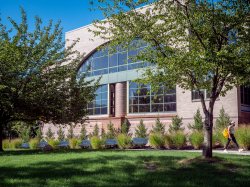Montclair State University Digital Commons Brings University Research to Global Audience
Posted in: Digital Commons, Homepage Features

Less than two years since its debut, the University’s institutional repository, Montclair State University Digital Commons, has connected the research, scholarly and creative work of the University community to a global audience on a scale unimaginable just a few years ago.
“We had 2,500 downloads in April 2018 when President Susan A. Cole announced the launch,” explains Karen Ramsden, the lead repository administrator for Digital Commons. “As of February 2020, we are up to over 68,000 downloads all over the world – in 177 countries.”
Montclair State University Digital Commons is an institutional repository that provides unlimited free access to scholarly and creative works, research data and other materials produced by the faculty, staff and students of the University and is a place where researchers and students can find others pursuing work to which they may be interested in contributing. Uploaded work ranges from a dissertation on refugee resettlement in the U.S. to archives of the student-run Montclarion newspaper dating back to 1948.
“The fact that researchers, the media or simply interested individuals are able to download this free knowledge from literally anywhere around the world, offers incredible opportunities to engage with faculty across nation-state boundaries and communicate with stakeholders that are miles away from our actual work location,” says Arnaud Kurze, assistant professor of Justice Studies and frequent Digital Commons contributor who has connected with students and researchers through the repository.
The creation of Digital Commons is seen as a critical component in the University’s having achieved an R2 – Doctoral University – High Research Activity classification by the Carnegie Classification of Institutions of Higher Education in February 2019. (Digital Commons is now complemented by the STEM-related Research with Montclair, a research platform, launched in January 2019 and run by Vice Provost for Research and Dean of The Graduate School Scott Herness, with Ramsden serving as lead administrator.) The University also participates in the statewide initiative, ResearchwithNJ, a research management portal that identifies experts, facilities, publications, intellectual property, news and events in five of the state’s universities.
Digital Commons, a service of the Harry A. Sprague Library, is maintained by Ramsden and repository committee members Kathleen Hughes, Denise O’Shea, Mei Ling Chow, Paul Martinez, Darren Sweeper, Siobhan MCCarthy and Dean of Library Services Judith Lin Hunt. The team has worked to make Digital Commons successful by actively promoting it to the University community, resulting in thousands of uploads. The library team’s work regarding best practices with Digital Commons was recently recognized with an award in January 2020. Additionally, work is almost complete on integrating the existing data between both research platforms through a beta test in collaboration with provider Elsevier, with the ultimate goal of increasing the University’s research content and visibility.
“Submitting your work to Digital Commons increases its visibility within an organized collection optimized for accessibility,” says Ramsden. While the Digital Commons author submissions document details everything scholars and researchers need to know about getting work into the Commons, Ramsden and the library team are standing by to help. “As long as you work here, if you’ve done any scholarly activities or research, you are welcome to upload, and the whole library team is happy to assist. We have the work of faculty, staff, provosts, deans, student research symposiums, archival information and dissertations. It’s a really broad scope of University activity.”
Ramsden notes that Digital Commons is also “a great way to familiarize yourself with your colleagues’ work. You can communicate with others in the field, or attract or maintain research partnerships and funding, all through your publications in Digital Commons.”
Associate Professor of Sociology Christopher Donoghue points out another use: “I’ve been using it to show students where they might find professors that share their interests and who might want to work with them on projects.”
Kurze also points to the boon for students and those outside of academia, calling Digital Commons “a Trojan horse for the democratization of higher education knowledge dissemination” – making research available through open sources while still assuring crucial quality through peer-review mechanisms.
“Our intellectual property, rather than being locked up behind expensive gatekeeping mechanisms, has become readily available to be read and spread across the web. It is a first step in the right direction.”
